- Home
- Kathy Reichs
Bones of the Lost Page 5
Bones of the Lost Read online
Page 5
“Is he.”
“These dogs were quite a score for your department.”
“You wouldn’t believe the items we confiscate.” Did the prig actually sniff?
“I’m sure the array is impressive.”
“Take rhinoceros horns. Traditionally, smugglers would grind them and hide the powder inside statues or other hollow objects. Now they’re importing whole heads, declaring them as legal antiques. They sever the horns, replace them with synthetics, and think they’re in business. How dumb do they think we are?”
“The Peruvian dogs came through Charlotte-Douglas, right?”
“Smuggling isn’t limited to big cities. Contraband can arrive at any port of entry.” Dew was opening up, though revealing only what was public knowledge. I knew the ploy. Had used it myself. “Did you read about the Tyrannosaurus bones seized up north?”
“Sir?”
“A semicomplete skeleton from the Gobi Desert. The imbeciles listed it on two different importation documents. As if we wouldn’t check. “Yep. Dew actually sniffed in disdain. “They declared reptile heads, broken fossil bones, and a couple of lizards.”
“What was the tip-off?” I picked up and started flipping a pen on my blotter.
“The materials were wildly undervalued. But the flashing red was the information entered as country of origin.”
“Which was?”
“England.”
“Tyrannosaurus-on-Thames?”
“Yes. The Mongolians had a giggle over that.” Delivered without a hint of a laugh.
“Good work.”
“The American people don’t fully appreciate what ICE does for international relations.”
“I’m sure the Peruvian government is thrilled you recovered their artifacts.”
“Which brings up a good point. Their head archaeologist is quite anxious to have the specimens returned promptly. And he very much hopes your examination can be as noninvasive as possible.”
“Of course. I’m hoping I can see all that I need to with X-rays.”
There was a long pause. Then, “I suppose I can share some facts, since you are involved in the case. The mummy bundles arrived as part of a shipment of pottery. Apparently Mr. Rockett thought we couldn’t tell bones from ceramics.”
“Seems pretty amateurish. Has Rockett been in the import business for long?”
“Since the early nineties.”
“In all that time he’s never been caught with illegal goods?”
“Mr. Rockett has either been straight, careful, or extraordinarily lucky. But the gentleman’s luck ran out on this one. The bundles turned up in a random check.”
“What’s his explanation?”
“He says he bought them from a farmer who owns the land where his son dug them up.”
“If he’s a successful importer, why risk smuggling antiquities?”
“He claims he had no idea they were old.”
Dew made one of those thinking-with-your-lips-or-teeth sounds. Deciding how much more to share?
“Are you familiar with Mr. Rockett’s background?”
“Only that he collects and sells indigenous arts and crafts from South America.”
“Have you met him, Dr. Brennan?”
“No.”
“Seen him?”
“No.” What the hell?
“Mr. Rockett is a veteran of Desert Storm. 1990.”
“The first Gulf War.”
“I’m not certain of the whole story. Perhaps a Scud missile, perhaps burning oil. Rockett suffered severe burns, leaving him badly scarred.”
I said nothing.
“War is cruel, Dr. Brennan. Mr. Rockett returned to a country where no one would hire him because of his disfigurement. Or so he believes.”
Still, I just listened.
“He couldn’t find a job. He was frustrated. Then Mr. Rockett remembered the souks of the Middle East, the goods available for next to nothing. Jewelry. Clothing. Household items. He formulated a plan. Buy overseas, sell stateside at tenfold the purchase price. Trinkets for the undiscerning.”
“Wouldn’t Rockett have a military pension, and disability?”
“Of course. But his import business provides a nice subsidy.”
“But the mummy bundles came from Peru.”
“Some time back, Mr. Rockett shifted his focus to South America.”
“Why?”
“Geographic proximity? Ease of operation? Personal safety?” I heard the swish of fabric, pictured impeccably clad shoulders rising in a shrug. “I really couldn’t say.”
“Americans aren’t popular in the Middle East these days.”
“Uprisings, revolutions, civil wars, kidnappings. Political instability negatively impacts any enterprise. Perhaps upheaval in the Middle East made South America more appealing.”
“Let me ask you something.” Casual, as though the thought had just entered my mind. “I’ve got a girl here, fourteen to fifteen years old, possibly Latina, possibly undocumented. She was killed in a hit and run near Old Pineville Road last night. We’re having trouble getting an ID.”
“Go on.”
“She had a pink kitty purse and hair barrette, and was wearing a short denim skirt, red blouse, and embroidered boots.”
“Sounds like any teenager. What makes you think she’s illegal?”
“She had a note in her purse about English language classes at a local Catholic church. The note was written in Spanish, and the parish also holds Spanish language mass. That, plus the fact that she had no form of ID, no keys, makes the lead investigator suspect she’s Latina.”
“Sorry, but I do artifacts, not people. I specialize in the illicit importation and distribution of cultural property, and the illegal trafficking of artwork. Besides, if this girl has not been determined with reasonable certainty to be illegal, ICE would not be involved.”
“Is there a colleague you could ask?”
“I’d help if I could. But unless you know your victim was undocumented … And even then …” Dew sounded distracted. “It’s not as if we have a list of every person who enters the country illegally. It’s quite the opposite. Sorry.”
“Sure.”
“When might you complete your examination of the mummy bundles?”
“Soon.”
“Please keep me posted.”
“Will do. And thanks for your time, Agent Dew.”
My fingers lingered on the cradled receiver.
And my nerves buzzed with frustration.
Dew was a dead end.
Slidell had his mind glued to a theory.
Time to call it a day. A lousy one.
Again, the nagging thought. Had I missed something?
Without making a conscious decision, I got up and walked to the cooler, my rubber soles squeaking softly in the stillness. Cold air whooshed when I pulled open the heavy steel door, enveloping me in the smell of refrigerated flesh. I flipped on the light.
Six gurneys lined the walls, three holding occupied body bags. I checked tags until I found the one marked MCME 580-13. Unknown.
I was glad no next of kin ever saw this frigid crypt. No mother ever viewed her child stiff from the cold. No husband ever gazed on his wife labeled with digits and letters.
I swallowed. Partially unzipped MCME 580-13.
The girl’s hair trailed like seaweed across her forehead, tangled and yellow.
Somehow wrong with her olive skin and dark lashes and brows. I looked closely at her roots. Noted a quarter inch of black at her scalp.
The girl’s hair was bleached. Could Slidell be right?
On reflex, I brushed wayward strands from the girl’s face. The pink barrette loosened and fell to the side of her head.
An image popped. Katy, blond curls in dual ponies, plastic barrettes holding unruly escapees.
I retrieved the girl’s lone possession and clipped it firmly in place. My hand lingered as it had on the phone.
“You have my promise.” My voice
sounded brittle in the small icy space. “I will find your family. I will send you home.”
Wanting to take a headshot, I reached for my iPhone.
Empty pocket.
My mobile was in my purse.
In my car.
In the courthouse parking lot.
The car I couldn’t retrieve because I had no ride.
The car I couldn’t drive because I had no key.
Cursing, I rousted up the Polaroid. After snapping the girl’s picture, I spent one more silent moment studying her features, then rezipped the bag.
Back in my office, I scanned the photo and emailed it to myself. Then I gophered through my desk drawers, hoping for peanut butter crackers or a stale granola bar. Lunch at the courthouse had been a Snickers.
My food quest turned up zip.
Great. I’d return hungry and empty-handed to my town house. To a peeved cat. And an empty fridge.
I was Googling for locksmiths and taxi services when the phone rang again. The call changed my plans.
I DON’T NORMALLY tense at the sound of pete’s voice.
Janis “Pete” Petersons. My ex. Sort of. Long story.
I fell for Pete in college. He was wrapping up law school, a post-fratboy charmer. Good mind, good body, good prospects. Good talker.
Our marriage was dandy for almost twenty years. Might have lasted if Pete hadn’t started sharing his charms with other women.
That aside—big aside, there—once we separated and time soothed the anger and hurt, I grew to like Pete’s company again. In the parlor, not the bedroom. Though, truth be told, the old embers can still smolder now and again.
Like many former spouses, Pete and I remain permanently linked. There’s our daughter, Katy, of course. And pets. When Pete travels, his dog, Boyd, is a guest at my town house. My cat, Birdie, bunks with Pete when I’m out of town. Sharing custody helps on both sides.
Over the years, Pete’s ring tone has come to signal a discussion of Katy, or the exchange of details concerning animal transfer. Occasionally a request that our daughter wants filtered through her old man the softy.
Tonight was not the ordinary call.
Pete never dialed my office line.
Oh, God!
I saw the girl zipped in the bag across the hall. The girl who’d been left to die on the roadside.
I saw Katy.
“What is it? Has something happened?” Fingers death-gripping the receiver.
“Relax. Katy’s fine. Where the hell have you been? I’ve been phoning you all afternoon.”
“It’s a long story. You’re sure Katy’s okay?”
“I Skyped with her this morning. Night there. Her unit was just back from a training exercise.”
“How’d she look?”
“Wired. Tired. Bunch of GIs shouting nearby. How much can you tell?”
One year ago, Katy was a researcher at the public defender’s office, bored, bitching, but safe in Charlotte, her single joy in life her boyfriend and absentee landlord, Aaron Cooperton. Out of college and completing a stint in the Peace Corps, Coop had joined the International Rescue Committee and volunteered for aid work in Afghanistan. He was on his way to Kabul to fly home to Katy when an IED blew up his convoy.
Katy was devastated by Coop’s death. Unaware of her close connection to him, the Cooperton family had excluded her, even barred her from the private funeral they held in Charleston. Katy was left with no closure and no way to grieve.
I watched my daughter start her mornings red-eyed and ragged, drag through her days. I listened and did what I could to comfort. Took her with me on a working trip to Hawaii. Nothing helped. It gutted me to see her in such pain.
Maybe I should have guessed what was coming.
Suddenly Katy was sparkling again, enthused about life. The dark shadows under her eyes slowly faded. Her chin reclaimed its cocky tilt. When she visited, it was no longer for hours, but for minutes squeezed in between pressing commitments.
It was Pete who told me she’d enlisted. In a call like this. Katy had kept her plans secret until the papers were signed.
“Don’t worry,” she’d said when finally we’d talked. “I won’t be in combat.”
Right.
On May 14, 2012, the United States Army opened HIMARS, High Mobility Artillery Rocket System, and MLR, Multiple Launch Rocket System, units to female soldiers for the first time. Early the next year, the military lifted its long-standing ban on women in combat.
Upon completion of her BCT, basic combat training, Katy requested MLR as her military occupational specialty, or MOS. Following AIT, advanced individual training, she was off to Afghanistan.
WTF?
I’ve consulted to JPAC, the military’s central remains-identification lab in Hawaii. I can play the acronym game, too.
I brought my mind back to the current conversation. “But how did she seem?”
“Psyched. Talked about doing the same training as the men. Artillery. Cannon platoons—”
“Oh, God.”
“She’s a tough kid. She’ll be okay.”
“You’re right. It’s just—”
“I know, sugarbritches. You see violent death every day.”
“Don’t call me that.”
“She’ll probably end up a general.”
“You think she’ll make a career of the army?”
“That’s not what I meant.”
“Why do you suppose she chose not to enlist in an officer candidate program? She’s a college graduate.”
“I think it was the time commitment.”
But Pete hadn’t called about Katy. He’d have done that this morning after he talked to her. I waited for him to get to his point.
“So what’s the long story?” he asked.
Really?
I summarized my adventures at the courthouse and was shifting to the hit-and-run case when Pete cut me off.
“Sounds like your day sucked. How about dinner?”
“What’s the occasion?” Wary.
“Can’t I ask a soon-to-be ex-wife to dinner?”
I had a hunch what he wanted. Wasn’t about to get roped in.
“No way I’m playing marriage planner for Summer, so don’t ask.”
In midlife, most men lust after sports cars. Pete had set his sights on a trophy wife. Summer was my fiftysomething ex-husband’s thirtysomething bimbo fiancée. Best in show for tits. DQ for lack of IQ.
“You know how she is,” Pete said lamely.
I knew only too well. I’d agreed to mediate for Bridezilla once already. Ended up catching flak from both sides.
“She needs guidance.”
She needs a muzzle and a tranquilizer dart. I didn’t say that.
The wedding from hell, postponed twice, now loomed near. At least five million people had been invited. School friends, work friends, friends of friends. Facebook boasted fewer chums than Summer.
“The wedding’s in less than two weeks.”
“Wait a day. That will change.”
“She’s panicking.”
“Give her a Valium.”
“She likes you a lot.”
“Look, Pete. Summer is your problem, not mine.”
“I know, I know. It’s just that I have depositions all week and a trial on the docket the instant we get back from Tahiti. I’ve been running around auditioning photographers, picking up thank-you cards, crap you wouldn’t believe. Every day there’s a new crisis.”
Typical Pete. For two decades I’d shouldered most of the child-rearing responsibility because his professional calendar always came first. Car pools; dentist, doctor, and orthodontist appointments; gymnastics, ballet, and swim-team runs.
Maybe if you hadn’t been so busy fussing over your baby bride’s Barnum and Bailey three-ring you’d have noticed your daughter these past months, caught the signs she was about to make a dangerous decision.
I didn’t say that, either. I waited, annoyed and anxious to hang up and phone for a taxi
.
“Tempe. Are you listening to me? I need the papers.”
The divorce agreement. I’d signed but not delivered it to Pete. Could have with little effort. So why the procrastination?
“Right. They’re on my desk at home. I should have given them to you ages ago. Sorry. Of course, come and get them anytime. There’s no need to take me to dinner.”
“I want to take you to dinner.”
I started to protest. Pete cut me off.
“I’ll pick you up out front. And I promise. Not a word about the wedding.”
“I don’t think—”
“How was it you planned to get home?”
Side-out, Pete.
FIFTEEN MINUTES LATER, a shiny new BMW convertible swerved to the curb. Red with black leather interior.
Trophy wife. Trophy car. I fought an impulse to roll my eyes.
Less commendable was Pete’s fashion sense. Sure, he could muster a suit and tie for court, but a golf shirt and khakis was his normal attire. My ex’s guiding principle: comfy and cool.
As I dropped into the passenger seat, my brows rose at the sports jacket, blue shirt, and navy slacks.
“Don’t we look snazzy.” Excluding the sockless loafers.
“I’m having dinner with a lovely lady.”
Orbital roll beyond my control.
“Nice wheels.” Keeping it light.
“Got a good deal.”
“Uh-huh.”
“Took ’er up to Asheville over the weekend. Purred like a kitten. Summer squealed at every switchback. Almost squealed myself once or twice.”
Squeals all around.
“Goes from zero to sixty in faster than you can say zero to sixty.”
Pete understood I cared little about cars. I knew he was tiptoeing to avoid mention of the upcoming nuptials.
I grabbed the armrest as he gunned out of the lot, cut left, right, then left again.
“Zero to sixty,” I said, smiling.
“Check out the sound system.” Pete tapped something and Maroon 5’s “Payphone” surrounded us in a moving cloud of noise that rendered further communication impossible.
Just past the Queens University campus, Pete winged onto the main drive at Sharon Hall, shot the tunnel of ancient magnolias past the white-columned manor house, and braked to a gravel-spitting stop in the parking area between the carriage house and its annex. Turning his head sideways, he gave me a two-brow waggle.

 Two Nights
Two Nights The Bone Collection: Four Novellas
The Bone Collection: Four Novellas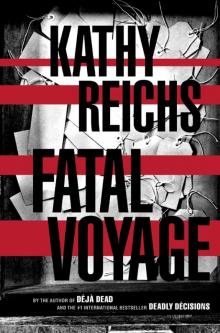 Fatal Voyage
Fatal Voyage 206 Bones
206 Bones Bones to Ashes
Bones to Ashes Terminal
Terminal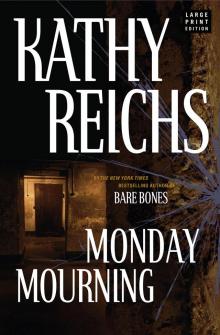 Monday Mourning
Monday Mourning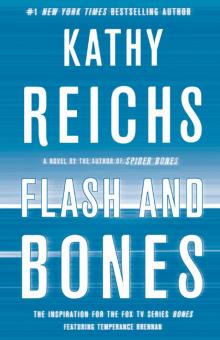 Flash and Bones
Flash and Bones Cross Bones
Cross Bones Devil Bones
Devil Bones Break No Bones
Break No Bones Swamp Bones
Swamp Bones Déjà Dead
Déjà Dead Shock
Shock Spider Bones
Spider Bones Death Du Jour
Death Du Jour Grave Secrets
Grave Secrets Trace Evidence: A Virals Short Story Collection
Trace Evidence: A Virals Short Story Collection Bones on Ice
Bones on Ice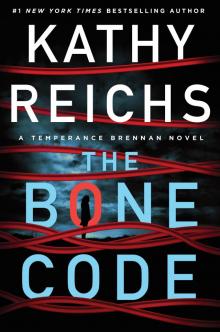 The Bone Code
The Bone Code Bones in Her Pocket
Bones in Her Pocket Seizure:
Seizure: Speaking in Bones
Speaking in Bones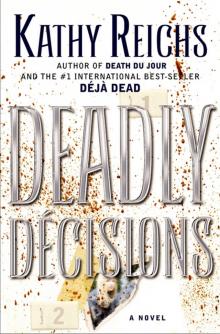 Deadly Decisions
Deadly Decisions Spike
Spike Bones Never Lie
Bones Never Lie Bones of the Lost
Bones of the Lost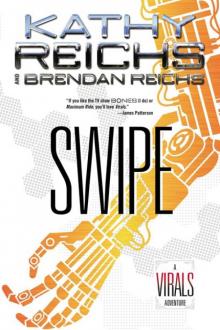 Virals 03.5 - Swipe
Virals 03.5 - Swipe Exposure
Exposure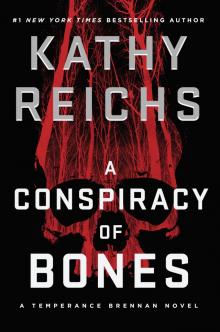 A Conspiracy of Bones
A Conspiracy of Bones Shift (tory brennan)
Shift (tory brennan) Bones of the Lost: A Temperance Brennan Novel tb-16
Bones of the Lost: A Temperance Brennan Novel tb-16 Virals tb-1
Virals tb-1 Bones Are Forever tb-15
Bones Are Forever tb-15 Code tb-3
Code tb-3 Seizure tb-2
Seizure tb-2 Deadly Descisions
Deadly Descisions Spider Bones: A Novel
Spider Bones: A Novel